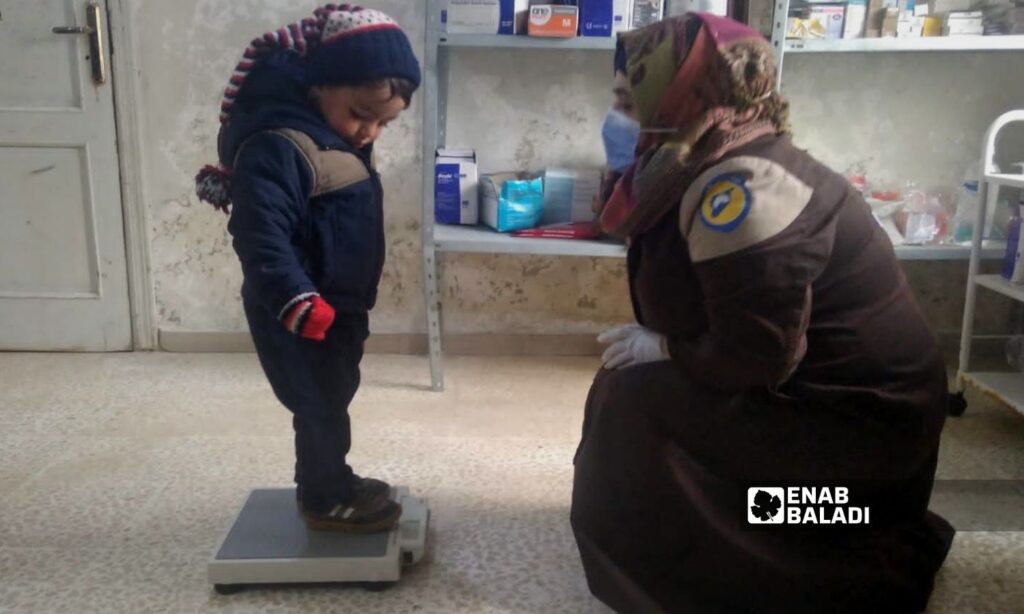Enab Baladi – Huda al-Kulaib
Hiyam al-Damour, 32, was unable to secure infant formula for her three-month-old daughter, Yara, due to high prices that rendered her unable to afford it. As a result, the little girl suffered from emaciation and general weakness in her tiny body, which ended in severe acute malnutrition.
Al-Damour told Enab Baladi that breastfeeding no longer meets her daughter’s needs, and she has not been able to feed her formula milk because of its high prices and the poor living conditions of the family; her husband is a day laborer, and he rarely finds a stable job or gets a good wage.
She had to feed her baby rice after grinding and boiling it, along with bread with tea and sometimes starch with sugar, which later led her to acute malnutrition, causing her to be hospitalized several times without yet fully recovering as a result of persistent causes of the disease.
Years of armed conflict and deteriorating economic and living conditions accompanied by a sharp decline in funding for the humanitarian response in Syria, especially in the northwest, have led some families to reduce their consumption and change their food patterns and quantities; they rely on food that is distributed in food baskets amidst their inability to buy different meat, depriving them of a balanced nutritional value through their food.
The change in food patterns and consumption directly affected people’s health and led to the spread of several diseases, most notably malnutrition and stunting among children, especially in Idlib displaced persons’ camps, in the light of poverty, declining living standards, price hikes, lack of essential basic foodstuffs, insecurity, and the water crisis. All this coincided with the absence of health care, which threatened children’s growth and body health.
Between 75 and 80% of families in Syria continue to experience a gap in income and expenditure to meet basic needs, according to UN figures.
Faced with this reality, al-Damour faces the dilemma of providing formula milk for her child, Yara, as its average price is about 4 US dollars (equivalent to 75 Turkish liras), according to the prices set by the Ministry of Health in the Syrian Salvation Government (SSG) operating in Idlib and parts of Aleppo countryside.
Meanwhile, the minimum wage for day laborers in northern Syria is about 45 Turkish liras, on average, according to a study conducted by the Syrian Response Coordination Group (SRCG) last May.
Over half a million stunted children
The 7-year-old Alaa al-Barro looked short and younger than his real age, as his body stopped growing years ago due to stunting, his 40-year-old mother Sarah al-Barhoum told Enab Baladi.
Sarah added that her child Alaa often suffers from high body temperatures and constantly needs injections and some costly medicines, knowing that a single injection costs about 250 US dollars, an amount that his displaced family is unable to constantly secure.
As to the reason for her son’s illness, the mother stated that it was due to neglect of nutrition and poor health during pregnancy, inadequate care, and lack of essential nutrients, along with the conditions of war, displacement, and poverty she had experienced and the inability to secure adequate food for him as a baby.
According to a United Nations of International Children’s Emergency Fund (UNICEF) report released in March 2021, a decade of war and dire humanitarian conditions in Syria have had a “terrible impact” on Syrian children and families, with more than half a million Syrian children under the age of five suffering from stunted growth as a result of chronic, acute malnutrition, while 90% of children require immediate humanitarian food and health assistance.
7000 malnourished children
The primary health care official in the Idlib Health Directorate, Duraid al-Rahmoun, told Enab Baladi that malnutrition was the result of a lack of adequate nutritional resources for children due to causes related to certain diseases that prevent absorption, or the cost of such resources and the inability to buy them due to poor financial means. This results in malnutrition, which is of varying degrees, including severe, moderate, and mild malnutrition.
Al-Rahmoun explained that the Idlib Health Directorate is working to contain the spread of malnutrition among children in the region, explaining that the number of malnourished children recorded in it has reached about seven thousand, and the degrees of malnutrition range from mild, moderate, and severe acute malnutrition.
According to al-Rahmoun, these cases are monitored and treated by specialized teams in partnership with local organizations in the region, the most important of which are the Syrian Expatriates Medical Association (SEMA) and Mercy without Limits, which targeted 40 areas through surveys, follow-up, and the provision of medicines and nutritional supplements until recovery.
Stunting is “within normal range”
Duraid al-Rahmoun explained that stunting is a disease caused by a deficiency of growth hormone (GH), which is secreted by the pituitary gland. It is a congenital hereditary disease, and hormonal drug therapy is given periodically during the rapid growth period, that is, before 18 years old.
Although most cases of stunting are caused by some genetic disorders, hormonal deficiencies and poor nutrition can also cause the disease.
Al-Rahmoun indicated that the proportion of stunted people remained within the normal prevalence limit. He acknowledged that there were no independent projects for the Idlib Health Directorate to treat these particular conditions, while treatment, although insufficient, is provided through small associations that compile data and try to secure injections through voluntary contributions.
In July 2020, the United Nations Office for the Coordination of Humanitarian Affairs (OCHA) reported that every 3 out of 10 children in northwestern Syria under the age of five were stunted as a result of acute severe malnutrition.
The rate of stunting among children aged between 6 and 59 months was 30%.
The prevalence of malnutrition among displaced persons is high from that in host communities, with 5% of the displaced children between the ages of 6 and 59 months affected, compared to only 3% of the children in the host communities.

